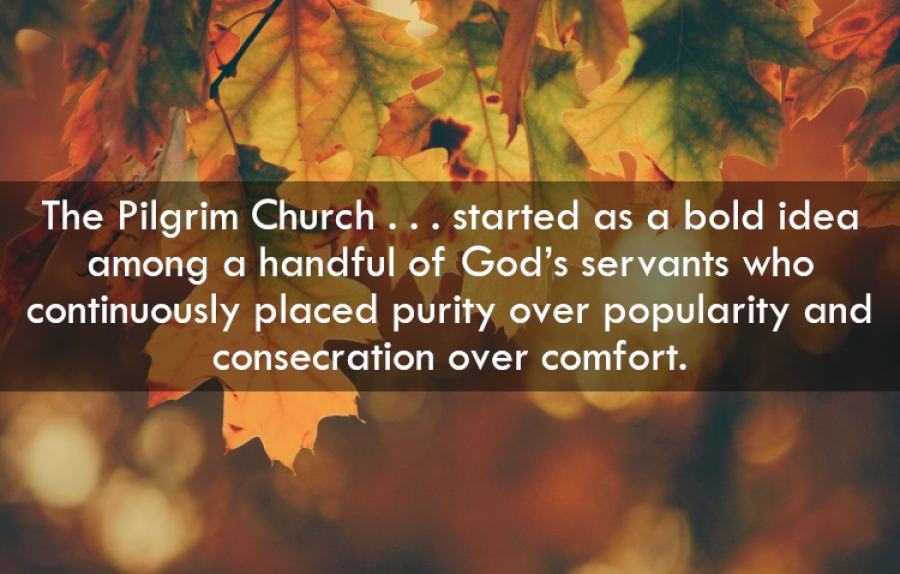Lessons from the Thanksgiving Pilgrims (Part 2)
Image

In my previous article, I introduced the importance of the Pilgrims, and shared a little bit of my own heart for my Thanksgiving, and my interest in studying and teaching on the Pilgrims.
This time, we will consider the first three of five essential lessons that we can learn from the Thanksgiving Pilgrims.
Pilgrimage
The Pilgrims vividly portray the pilgrim-like nature of the Christian life (Heb. 11:13; 1 Pet. 2:11, 12).
This is, of course, the truth for which the Pilgrims have been named, since they lived it out so completely in their spiritual lives. The Pilgrims left all they had in order to seek a place where they might worship God freely and witness for Him fruitfully. Their journeys took them from their homes in Scrooby, England, to Amsterdam and Leyden in Holland, then ultimately across the stormy ocean to this New World.
The Bible admonishes all believers to think of this life with the mindset of a pilgrim, a stranger in the world, a foreigner among the nations of people whose interests are centered upon this earth (Phil 3:20).
As Christians, we are the ambassadors of another kingdom (2 Cor. 5:20); therefore, we do not plant our roots too deeply here. We must not be like the earth-dwellers who are spoken of in Rev. 3:10; 6:10; 8:13; 11:10; 13:8, 12, 14; 14:6 and 17:8. Instead, we realize that at any instant we might be gloriously transported from earth to Heaven. Until that day, we follow the Lord wherever He leads in order to accomplish His will.
The Pilgrims earned their title by being willing to circle the globe in order to serve God more perfectly. Do we have that same mentality in the 21st century? Do we appreciate and use the religious liberty for which they so desperately longed?
And, as such religious liberty appears to be on the wane in our time, will we learn the lessons that the Pilgrims have to teach us about living in “such a time as this” (Esth. 4:14)?
As pilgrims we must be willing to follow the Lord wherever He calls us.
Power
The Pilgrims demonstrate the value and potential of a small church (Rev. 3:8).
So often in this day of mega-churches and church growth principles, the small church feels left out, as if its value is limited and its service unimportant. Thus, the Pilgrim example should be encouraging to many. The Pilgrim Church (yes, the Pilgrims were part of one single congregation) demonstrates for all time that a very small church may have a very vibrant and vital ministry.
The post-exilic prophet Zechariah asked: “Who has despised the day of small things?” (Zech. 4:10). History resounds with the cry that none dare despise these Pilgrims.
The Pilgrim Church began from nothing in 1606. It started as a bold idea among a handful of God’s servants who continuously placed purity over popularity and consecration over comfort. God blessed their work and caused the congregation to grow to include about 300 people in Leyden, but the number that came over to Plymouth was only 35.
Yet God used that small band to form the beginning of this nation—while they meanwhile became its first great evangelical missionaries! There is no limit to what God can do through those who trust Him as completely as the Pilgrims did—no matter how small their numbers, or how great the odds against them.
God’s Plan
The Pilgrims display the faithfulness of God to His people (Phil 1:6).
God has a plan and purpose for history, and this includes a plan and purpose for each individual who knows Him. The Bible tells us that God “works all things according to the counsel of His will” (Eph. 1:11), and He graciously chooses to use us to fulfill His plan. Thus, until His plan is accomplished in and through us, He will be faithful to us.
God allowed the Pilgrims to suffer numerous trials as they fled persecution in Europe and sailed the Atlantic to come to the New World, but even in those times He gave evidence of His faithfulness to them. (For instance, while they were crossing the ocean, the Mayflower crew famously used a large screw—probably a piece of a printing press—to secure a cracked beam and save their entire journey.)
The Lord worked out His plan in their lives and used them to lay the foundation for this great nation. He allowed them to have influence in the civil realm as well as in the theological and spiritual realms.
As Gov. William Bradford wrote in Of Plymouth Plantation:
A great hope and inward zeal they had of laying some good foundation, or at least to make some way thereunto, for the propagating and advancing the gospel of the kingdom of Christ in those remote parts of the world.
God was faithful to show His love for us in the sacrifice of Christ on the cross, and He is ever faithful to continually guide His people through all things. Like trailblazers before us, the Pilgrims show us the way to trust Him in unusually difficult circumstances.
May God help us to emulate these great characteristics that we see so clearly in the Thanksgiving Pilgrims.
We will consider the final two lessons in the next installment.
Scripture taken from the New King James Version®. Copyright © 1982 by Thomas Nelson. Used by permission. All rights reserved.
Paul Scharf 2019 Bio
Paul J. Scharf (M.A., M.Div., Faith Baptist Theological Seminary) is a church ministries representative for The Friends of Israel Gospel Ministry, serving in the midwest. He also assists Whitcomb Ministries and writes for “Answers” Magazine and Regular Baptist Press. For more information on his ministry, visit foi.org/scharf or email [email protected].
- 23 views


Discussion